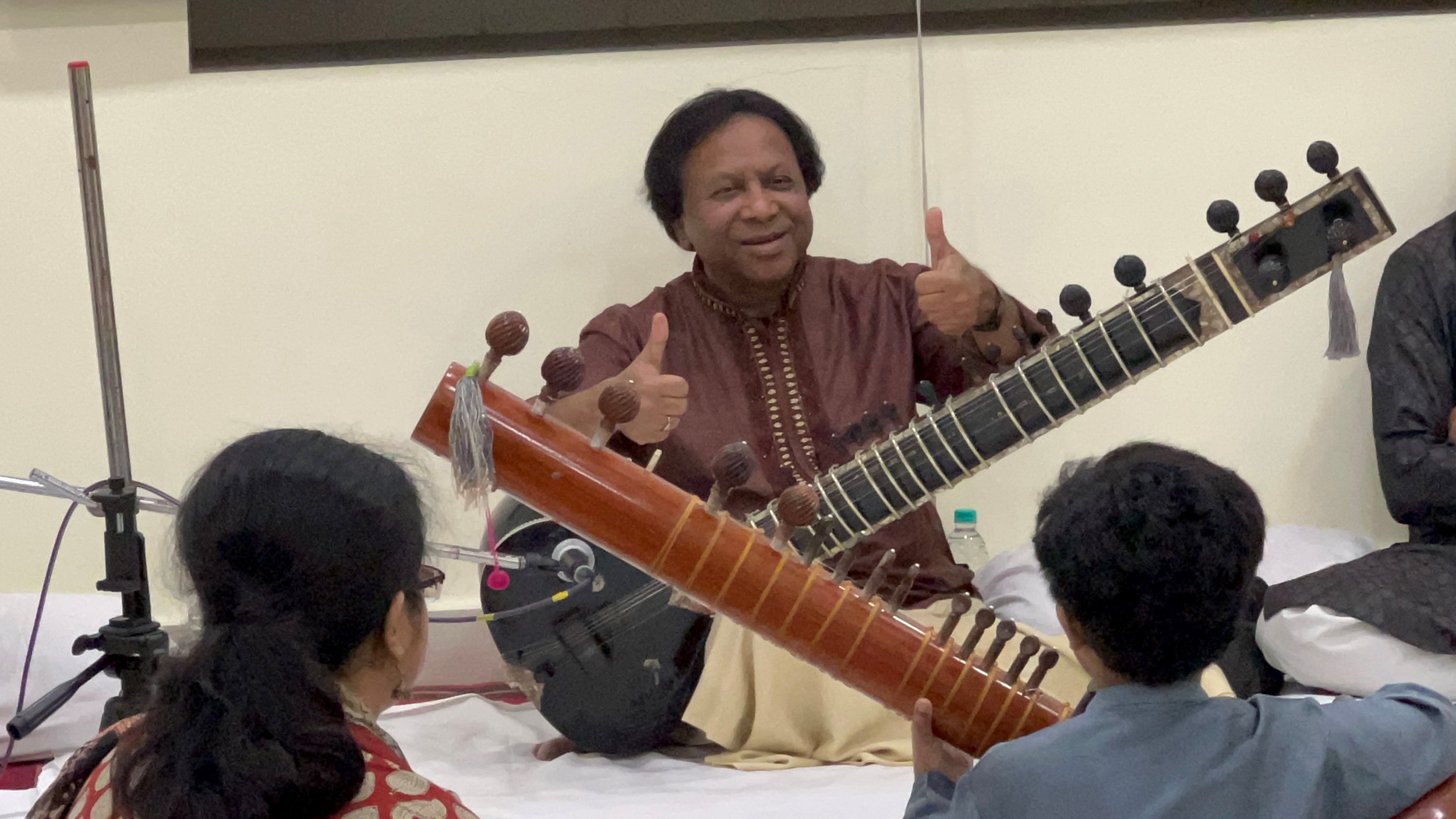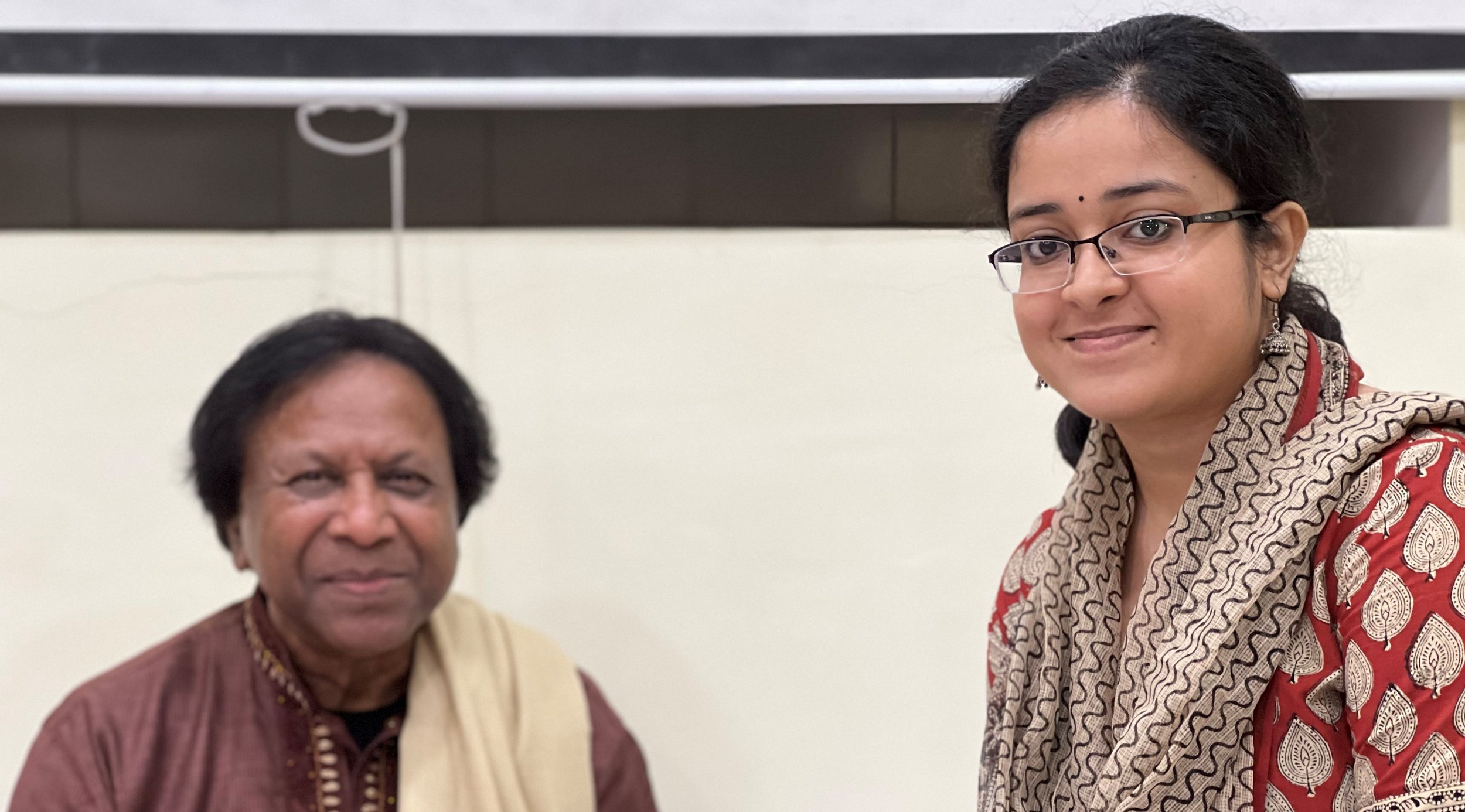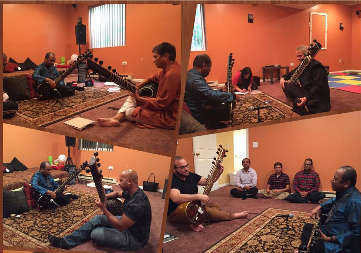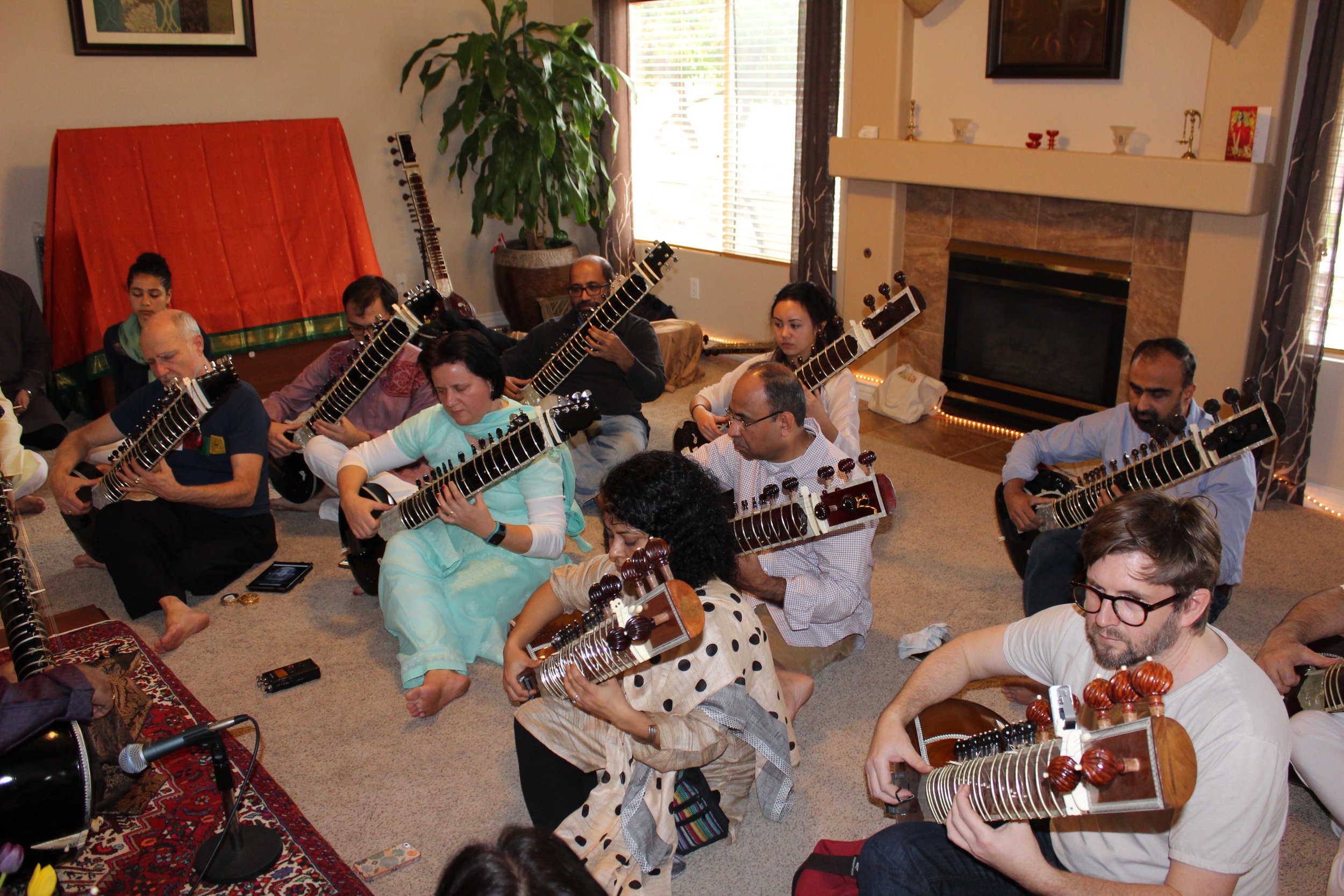The SPK Academy of Music recently celebrated Guru Purnima with Ustad Shahid Parvez Khan. Sitar students of all ages performed for their guru, showcasing their acquired knowledge and paying their respects to the sitar maestro.
Kolkata Workshop - March 2022
Following our initial fundraising round in November 2021, the SPK Academy was able to hit the ground running in 2022 with its charitable work. The first event was a sitar workshop held in Kolkata in March 2022. SPK students Alpa Shah and Kelly Johnson sat down with Seema Gulati, SPK Academy’s director after the event to learn more.
What were the goals of the event?
Now that the SPK Academy has become a non-profit organization, we are better positioned to pursue one of our major goals for the future, namely to increase awareness of Indian Classical Music across the globe, through the teachings of Ustad Shahid Parvez Khan.
Making Ustadji and the unique resources of the Academy accessible to sitar lovers in India is a very big part of this. Starting in Ustadji’s beloved Kolkata, this first workshop provided music students in India the chance to learn music directly from him and to get acquainted with the work and teaching methods of the SPK Academy. The Academy covered Ustadji’s teaching fee in its entirety, while the students were only charged a nominal Rs 500 (US$6) registration fee to attend.
Twenty-five students of all levels came, and for many, it was truly the experience of a lifetime. Their excitement hung palpably in the air… with the music!
“Thank you so much to SPK Academy of Music for this life-changing experience of getting to learn from Ustadji! Truly grateful for this opportunity ”
Why Kolkata?
For everyone at the SPK Academy, it is very special to be able to repay in some small way the inestimable debt owed to India for sharing with us its rich classical heritage so wonderfully “packaged” in the music of Ustad Shahid Parvez Khan.
It is also important to mention that Ustadji expressly chose Kolkata for the first SPK India workshop as a city that holds a special place in his heart. Kolkata helped raise Ustadji musically in his youth and remains a major hub of Indian culture, art, and music.
What did the workshop involve?
The workshop took place over 6 hours, with students divided into groups according to their ability. Each group was in for a real musical treat, with a selection of beautiful material to learn and practice. Ustadji taught compositions and taans in three different ragas - Khamaj, Hansadhwani, and Abhogi - giving the students a feel for how teaching is conducted at the Academy.
While most students came to learn on the sitar, others came with a variety of other instruments, including guitar, sarod, and tabla. The tabla players accompanied the instrumentalists while Ustadji taught.
As he often does, Ustadji took the time to provide the tabla students with rare rhythmic compositions that are not only precious but also extremely exciting. These helped keep the energy at peak level throughout the event. Ustadji also answered student questions on musical concepts and often provided demonstrations on his sitar.
The careful attention paid to his every word showed what a rare treat it was to hear the maestro play and discuss music in such close proximity! Hopefully, it will be much less rare in the years ahead.
Students came away from the workshop excited, energized, and profoundly grateful to Ustadji, and to the Academy for helping to provide the opportunity to learn. At the workshop’s conclusion, many participants said that it was a huge blessing for them to attend and that they would not have been able to afford access to such musical training without the SPK Academy’s sponsorship.
Seema Gulati, as the Director of the Academy, expressed to us how gratifying it was to be able to make this event possible, especially after seeing just how much it meant to the students. She also felt there was a wonderful reciprocity underpinning the event. SPK Academy succeeded in sowing the seeds of musical inspiration in Kolkata, while at the same time Kolkata inspired and energized the music in a way unique to the “City of Joy.”
With one India workshop complete, what happens next?
Since the workshop, a number of students have enquired about how they can continue to learn with the Academy. In response, the Academy is now offering virtual lessons with Ustadji and US-based senior instructors at country-adjusted rates for Indian students.
The Academy will also be conducting several more workshops in other Indian cities, after which students will be able to apply for financial assistance to undertake training through the Academy. Scholarships will be awarded to promising students who can demonstrate their commitment and dedication to the music.
Where will the next workshop be?
This year’s fundraising round began with the SPK Academy’s 10-year anniversary. By February we had already received pledges of close to US$60,000!
Our goal this year is to raise US$110,000.
These funds will allow us to proceed with hosting a number of new workshops, currently planned to take place in Chandigarh, Varanasi, and Delhi. Stay tuned!
SPK Academy Has 501(c)3 Status!
Anusri Mittal
At age five Anusri attended her brother’s tabla lesson but was powerfully drawn to the melodies of sitars being played nearby. Four years later, in 2010, she found the SPK Academy and began to learn sitar in the Etawah tradition. She was nine years old. However, there was a major obstacle to overcome, as her family moved to China that summer. Thus she became the Academy’s first Skype student, waking up at 6 in the morning to accommodate the time difference. When Anusri finally got the opportunity to study with Ustadji in person at shibirs and workshops, she had yet another obstacle to overcome - her innate shyness. Once again love for the music prevailed as she traveled from her new home in Detroit to learn in Phoenix. Anusri’s progess on the instrument attests to her level of dedication. She presently lives in California.
When you started the sitar, did the influence of your parents affect your decision to learn?
It was my choice to start, but sometimes they would force me to practice. Now I’ve realized that if I want to progress, I need to practice.
Do you enjoy playing sitar?
I do enjoy it. Even if I’m doing something else, I’ll find myself playing taans in my head.
What is your favorite raag?
Yaman.
Have you been to any shibirs?
I attended a shibir many years ago and then one in Phoenix last January. It’s a very creative environment; there’s always people practicing, you can hear sitar everywhere. It’s a perfect time to just focus on sitar.
What are your plans for the future?
I’m graduating from Valencia High School next May, and plan to attend a four-year college, to major in either marketing or international relations. I also want to continue learning Chinese.
Do you have a specific musical goal?
Yes, I want to be able to play all of the pieces where I pull, and do it comfortably.
Do you have any thoughts you’d like to share about the Academy?
SPK Academy has been a great experience, and I’m very happy to have been a part of it for the last eight years. Everyone is very encouraging. And it’s such an honor to learn with Ustadji, I’m very thankful for that.
Ustadji says Anusri has all the qualities necessary to become a fine sitarist. She has shown both commitment and talent and he encourages her to follow her musical dream.
SPK Academy of Music student, Anusri performs for Ustad Shahid Parvez Khan and other SPK Academy students at a weekend-long intensive workshop/shibir.
The SPK Academy Learning Experience
Many music academies exist, but few that rigorously uphold the tradition of the guru-student relationship, or guru-shishya parampara; here at SPK Academy, this is the foremost pillar of our foundation. Though Ustadji uses a variety of more modern techniques, such as Skype, to impart his musical knowledge, the tradition itself remains intact. However, no amount of online lessons can replace the experience of in-person lessons, for it is not only material being taught, by observing the guru, how he lives apart from music, his philosophies, personality, only then can his music be more deeply understood, and ultimately, played.
It is at a shibir, a three-day music camp, where the magic happens, where for those three days, no matter how long it has been, we are instantly at home in the company of our fellow students and Ustadji.
One student writes, “...Shibirs. Weekends away from everything, when I can truly focus on my passion - music. These amazing events give me a chance to spend first hand time with those I consider family, and at the heart of it all is my guru, my Ustad.”
~Avichal Jha
To the newcomer, the first shibir can be very intimidating, but by the third or fourth, one knows what to expect, and what is expected of him or her, but even within the usual shibir schedule, it is really Ustadji’s mood that dictates the flow of the shibir. It is not an easy art, but like all difficult things, every minute of hard work and practice is rewarded in the end. Whether you are simply curious or wish to pursue music seriously, a shibir is the place to experience Ustadji’s music in all its brilliance; it is the place to discover and or deepen musical love.
Workshops provide a shibir-like environment that is accommodating to those who cannot attend shibirs, due to busy work schedules, as well as a supplement to keep students on track as shibirs are usually spaced several months apart. At workshops, students can receive undivided attention from Ustadji (Ustad Shahid Parvez Khan)
Skype lessons with Ustadji offer musical training to students who are travelling or unable to attend workshops or shibirs, and are an invaluable tool we can use to stay connected to music.
Senior students Gagandeep and Jay shared their thoughts on Skype lessons.
“I would describe Skype lessons with Ustad ji as a great medium of instruction. It's as real as it can get to replicate a one on one in-person experience of learning from Ustadji. What I like most about Skype classes is that the content of class is tailor-made to suit your individual learning needs. It's Ustadji speciality to come down to the level of the learner, irrespective of his/her proficiency level or command of the instrument.”
~Gagandeep Singh
“It provides priceless one on one time with Ustadji, something that can be very difficult to obtain during a large shibir or group workshop. When the Shagirds get together, we always ask each other, "Have you had any Skype lessons? What are you working on?”
~Jay Matrona
Each mode of learning offers something unique, but the combination of shibirs, workshops, and Skype lessons fulfills all of a student’s musical needs, making for a complete learning experience.
















